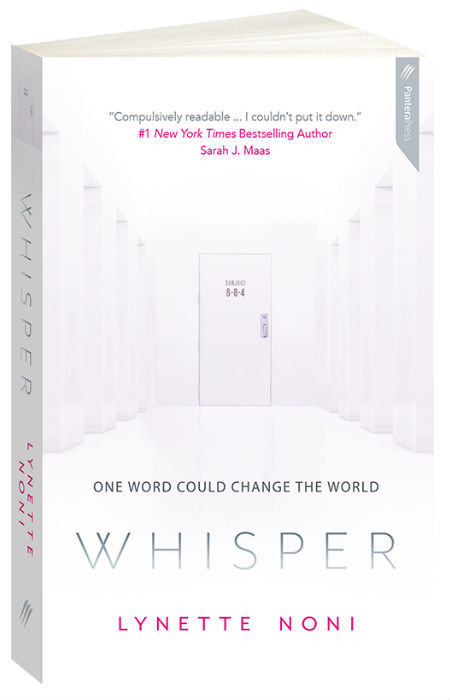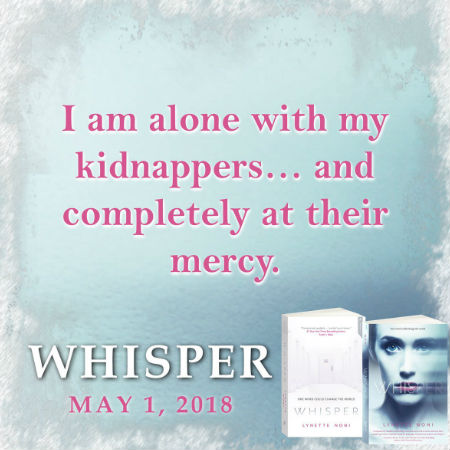
You have to admire any author who plunges into the well-travelled waters of genre literature, particularly when it concerns mutants, often held aloft as humanity’s possible evolutionary future and the subject of many a graphic novel or film series.
But Australian author Lynette Noni, who is best known for The Medoran Chronicles, has not only taken this challenge but bested it in Whisper, successfully imbuing this particular wing of genre lit with a fresh perspective and vitality similar to that bestowed by M. R. Carey on the world of the zombie apocalypse with The Girl with All the Gifts and The Boy on the Bridge.
Of course, the genius in her approach is that you’re not even aware at first that she’s waded into these murky waters at all.
Our protagonist, Jane Doe aka Chip, is presented as s a mysterious figure trapped in an underground complex where her heavily-circumscribed day consists of visits to a personal trainer, Enzo, who is the Good Cop of the equation, a psychologist, Dr Manning, who is the Ineffectual Cop and Dr Vanik, a Mengele-like madman who performs all kinds of disorienting experiments of her brain.
He is most certainly the Bad Cop of the piece, but while we are present to the repetitiveness of Jane’s uniformly and suffocating bland and yet painful days, and come to understand how she feels about her life, such as it is, through some fearsomely well-written inner monologues, we emerge none the wiser for a while exactly why Jane is where she is and what all these people, good, bad and indifferent want with her and what they hope to achieve.
“I suddenly realize I need to get out of here. These people are too normal. They’re too real. They’re too … colorful. I’m used to bland. U’m used to whitewashed. I’m used to pillowcase uniforms, regulated meals and unchanging schedules. I don ‘t know what to do with fluffy beds, warm clothes, steaming soup, reflective mirrors, chocolate chips, and laughing angels. That’s not my life — not anymore. And it never will be again.” (P. 63)
When Jane’s true nature emerges, and it’s done in spectacular way in the midst of an ordinary day-to-day situation, it sets in train a cavalcade of well-executed revelations that give not just a fresh slant on mutantkind but an Australian flavour to a preciously almost wholly-American narrative.
For Jane and all the other residents of Lengard as the facility is known are based in Sydney, hidden away deep under the city’s premier shopping strip, Pitt Street Mall, close enough to the normal people of the world to join them above ground in carefully-supervised excursions but a million miles from them in both their innate physical humanity and lifestyle.
Rather than placing them out in the far reaches of the desert-like Outback, which is always the go-to location if you want to give a people or place an added mystery or intrigue, Noni has plonked them fairly and squarely under the heart of Australia’s biggest city, illustrating in the process that they are us and yet no us all at the same time.
Initially though as we try to understand where Jane is – because she has no idea, neither do we for the longest time – we are in the dark along with her, aware there is a great deal unknown but unaware of what it is and whether it presents a threat or a promise.

That Noni sustains this aura of uncertainty, and sustains it grippingly well, for as long as she does is testament to how supremely well she establishes Jane as a character from the get-go.
Without her singularly focused and strong inner narrative, through which we get a handle, or the suggestion of what might be going on at least, on her tightly-drawn world, Whisper would not succeed anywhere near as it does.
That’s not say other elements of the world don’t work well – everything from the storyline to the many revelations to the other characters such as Landon Ward who proves pivotal to her coming to grips with who is and much more besides are beautifully well done (save for the lengthy slabs of exposition in the middle and end sections which, while fascinating and eagerly-devoured, do slow down proceedings down a little) – but it’s Jane who is the star of the show, a mightily strong older teenager who might often be cowed but is never truly beaten.
While you sometimes get the sense she is maybe a little inert in the face of the many blindingly revelatory things that come to bear on her, she is for the most part able to rise to the challenge, not just externally but internally, her inner self bolstered and nurtured by the 2 1/2 years she spends walled-off within herself, unable to speak for reasons that are revealed as the novel progresses.
“The ground is dissolving under my feet. Surely I must be sinking into an alternate dimension. One where silent girls are befriended by armored knights and bouncing children and swallowed up in dreams so real they bleed life into the very walls, turning the blandness of whites, grays and beiges into rainbows so dazzling that the air itself comes alive with their colors.” (P. 87)
To delve too deep into the many revelations would be to walk straight into spoiler alert land, but suffice to say that Jane’s journey, the revelation of her real identity, gifts and destiny are artfully and satisfyingly-handled, delivering on the promise of the opening chapters.
Melodrama creeps in a little here and there, but by and large, Whisper is a compelling tale well-told that never falters or staggers drunkenly under the ever-growing weight of its mythology, but gathers strength chapter-to-chapter, reinventing the genre it occupies with an imaginative flair and emotional resonance that takes an almost otherworldly concept and makes it accessibly, wondrously human.
That is, of course, the secret to really good genre writing; while it’s fun to throw in a host of supernatural bells and whistles, to delve into realms far beyond the ordinary, suburban everyday, the story of any of these denizens of genre lit is that of us all.
They may have amazing abilities, extraordinary insights and be engaged in titanic battles hidden from the eyes of mere mortals, but they are still undeniably, fallibly human, and Whisper is such a captivating, immersive read because it remembers this, giving us a protagonist in Jane who is compelling, sympathetic and real, even as she finds, like we do, that she is part of a world far greater and more expansively-thrilling and dangerous than our own.
